Essential Feeding Guide for Your Senegal Parrot
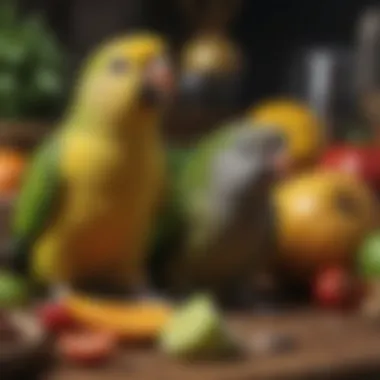
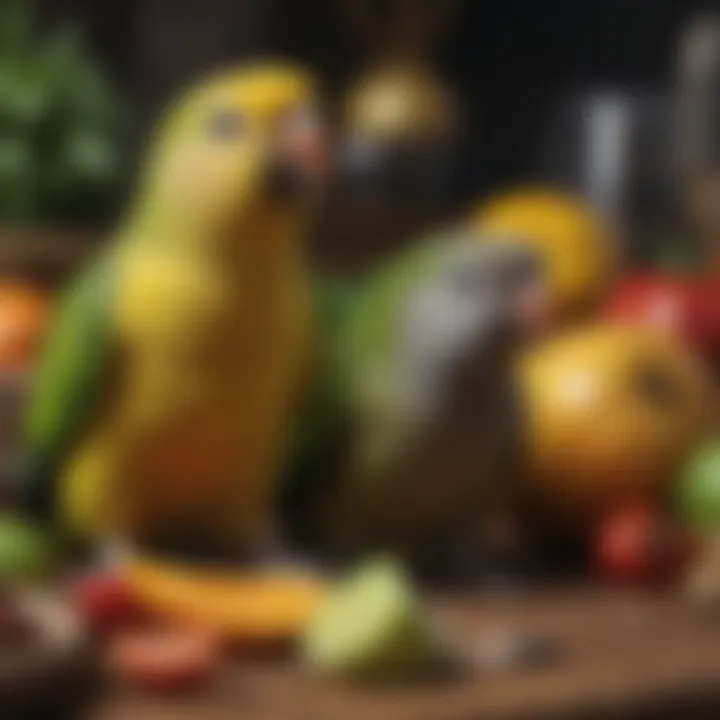
Intro
Understanding the feeding needs of your Senegal parrot is critical to fostering a healthy avian companion. These charming birds, known for their vibrant personalities and striking plumage, require a diet that caters specifically to their nutritional needs. Pet owners must navigate through an array of food options, each with its own benefits and drawbacks, while also considering the individual quirks of their feathered friends.
In this guide, we will explore the essentials of avian care, focusing on proper nutrition. By dissecting vital nutrients, suitable food sources, feeding frequencies, and common dietary concerns, we will equip you with the knowledge needed to keep your Senegal parrot happy and nourished. This comprehensive approach aims to demystify the complexities of avian nutrition, empowering you to create a balanced dietary plan that enhances your pet’s well-being.
Avian Care Basics
Importance of Proper Nutrition
Feeding your Senegal parrot the right diet is akin to giving it a solid foundation. Just like humans, birds thrive on balanced nutrition that supports their physical health and energy levels. A diet rich in vitamins, minerals, and other essential nutrients not only strengthens their immune system but also promotes vibrant plumage and a lively demeanor. Remember, malnutrition can lead to a host of problems ranging from feather deformities to organ failure.
Understanding Bird Species and Their Needs
Every bird species comes with its own set of dietary requirements. Senegal parrots are primarily herbivorous, needing a diverse range of seed, fruits, and vegetables. However, it’s important to note that not all seeds are created equal. High-fat seeds can lead to obesity if not monitored. A well-rounded diet should include:
- High-quality pellets designed for parrots
- Fresh fruits like apples, berries, and bananas
- Leafy greens such as kale and spinach
- Safe vegetables like carrots and peas
Basics of Birds Habitat Setup
Creating a suitable environment for your Senegal parrot goes hand in hand with proper feeding. Their habitat should have easy access to food and water while providing space for exercise. Birdcages should be spacious enough to allow free movement. Use natural perches and toys to keep their minds stimulated. The right setup not just complements their feeding routines but also encourages healthy habits.
Grooming and Hygiene Tips
Keeping your Senegal parrot clean is as critical as feeding it well. Regular grooming sessions—like combing their feathers—play a role in their health. Moreover, keeping their food and water containers clean helps avoid bacterial infections and ensures that they receive proper nutrition. Watch for any signs of mess in their cage after meals and tend to it promptly.
Proper diet and environment are two sides of the same coin when it comes to avian care.
This foundational knowledge sets the stage for more in-depth discussions about interacting with your pet, understanding their emotional needs, and addressing health and safety concerns.
Understanding Senegal Parrots
Understanding Senegal parrots is paramount for anyone looking to nurture these beautiful birds. In this section, we'll cover key aspects about their species, their natural habitat, and diet. Grasping these elements lays the groundwork for establishing proper feeding regimens, ensuring balanced nutrition, and ultimately fostering a lasting relationship with your feathered companion.
Overview of the Species
Senegal parrots, known scientifically as Poicephalus senegalus, boast a captivating appearance with vibrant green plumage, accented by shades of yellow and orange. These medium-sized birds generally weigh between 120 to 180 grams. Their cheerful, playful, and sometimes sassy behaviors make them great companions.
In the wild, these parrots showcase an impressive adaptability, thriving in a range of environments, from woodlands to savannas. But what makes them remarkable is their social nature. Senegal parrots live in flocks and exhibit a variety of vocalizations to communicate with one another. Owners should consider these traits when choosing to bring one into their home; providing them with social interactions and mental stimulation is essential for their well-being.
Natural Habitat and Diet
Senegal parrots primarily originate from the western region of Africa, especially Senegal, hence their name. Within their habitat, they prefer areas with tall trees where they can perch and forage. Their diet in the wild includes a mix of seeds, fruits, nuts, and flowers. This diverse menu helps them acquire essential nutrients necessary for survival.
When it comes to feeding your Senegal parrot, replicating their natural diet as closely as possible is crucial. A varied diet that includes a mix of seeds and fresh produce can help mimic their foraging behavior. Incorporating foods like sliced apples, leafy greens, and high-quality pellets designed specifically for parrots can keep their diets well-rounded. Remember, ensuring they have a chance to explore and engage with their food not only satisfies their nutritional needs but also provides enrichment that keeps them mentally active.
Ultimately, understanding the Senegal parrot's natural habitat and dietary preferences gives you a head start on providing them with a healthier life. Regular interaction and proper feeding strategies play unison in creating an environment where both the bird and the owner can flourish.
"You can’t rush a bird to be healthy; it's all about nurturing its natural instincts and offering the right opportunities."
By taking the time to learn about these birds, you're setting the stage for a rewarding experience with your Senegal parrot.
Nutritional Needs of Senegal Parrots
An understanding of the nutritional needs of Senegal parrots is crucial for maintaining their health and longevity. These beautiful birds, renowned for their vibrant personalities, thrive on a balanced diet that mirrors their natural feeding habits. If you're a pet owner or bird enthusiast, grasping the specifics of avian nutrition helps ensure that your feathered companion receives the vitamins, minerals, and energy it requires for optimal growth and health.
Essential Nutrients
When we talk about essential nutrients for Senegal parrots, it’s about more than just stuffing seeds in a feeder. Essential nutrients are the building blocks of their diet. Parrots, like people, need a variety of food types to flourish. The primary nutrients include proteins, fats, carbohydrates, along with an assortment of vitamins and minerals. Each plays a role, from muscle health to feather growth.
- Proteins are vital for growth and repair. Without enough of them, your parrot might not develop proper muscle or feather quality.
- Fats are not just energy sources; they also support brain health. Healthy fats can be beneficial but should be given in moderation.
- Carbohydrates are the energy boosters, providing the fuel for everyday activities.
In summary, understanding these essential nutrients establishes a baseline for creating a diet that supports all aspects of a Senegal parrot's well-being.
Understanding Macronutrients
Macronutrients are the nutrients that parrots need in larger amounts, and include proteins, fats, and carbohydrates. Each plays an indispensable role in the health and vitality of your feathered friend.
Proteins
Proteins are the building blocks of life. These are crucial for muscle development and maintaining healthy feathers. When it comes to feeding Senegal parrots, ensuring an adequate source of protein can fundamentally affect their overall health. Good sources of proteins include legumes, cooked eggs, and specially formulated parrot pellets. The importance of protein cannot be overstated, as it supports every physiological body function. However, an excess can lead to kidney strain, so balance is key.
Fats
Fats are essential, but less is more in this case. They are a concentrated energy source and contribute to healthy skin and feathers. Functional fats include omega-3 and omega-6 fatty acids, found in foods like nuts and seeds, that promote good health. However, overdoing it with fatty foods can lead to obesity, which brings a host of health problems. Always strive for a mix of healthy options for balanced fat intake.
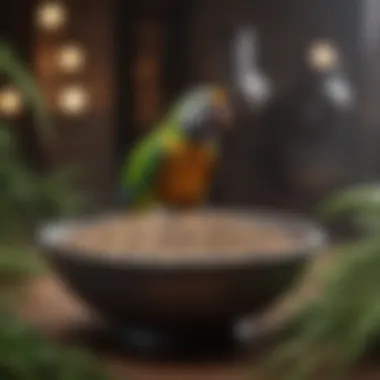
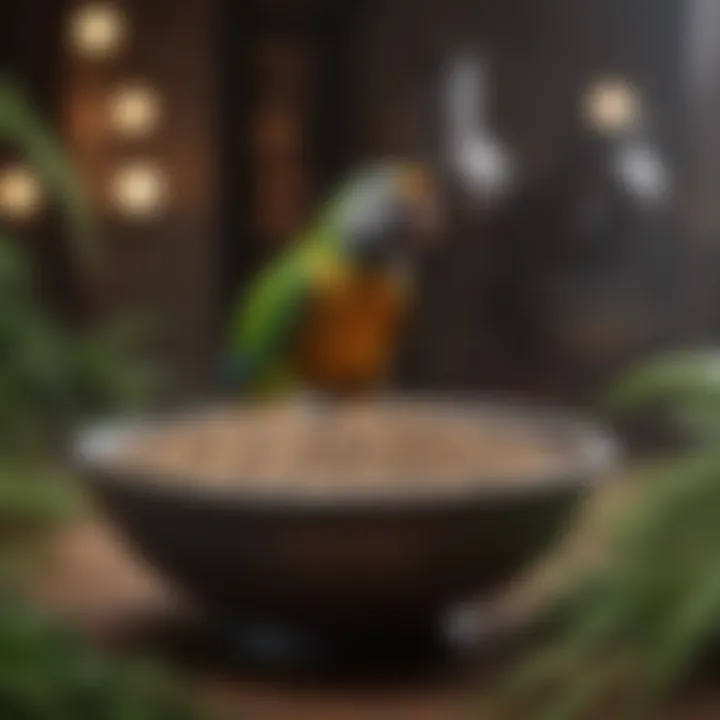
Carbohydrates
Carbohydrates are not just fillers; they provide essential energy for your parrot's daily activities. These compounds can be derived from fruits and certain grains. Think of carbohydrates as the fuel that keeps your parrot active and playful. Choosing whole grains over refined options usually provides better nutritional value. However, watch portion sizes, as too many carbs can lead to weight gain.
Role of Micronutrients
Micronutrients, while needed in smaller amounts compared to macronutrients, are just as crucial for the health of your Senegal parrot. These include vitamins and minerals which support everything from immune function to feather pigmentation.
Vitamins
Vitamins are indispensable for various metabolic functions. For example, Vitamin A is vital for vision and skin health, while Vitamin D3 aids in calcium absorption. Offering a variety of fruits and vegetables ensures that your parrot receives a broad spectrum of these necessary vitamins. However, care should be taken to avoid excessive amounts, as hypervitaminosis can be adverse.
Minerals
Minerals such as calcium and phosphorus are vital for bone strength and the overall systemic function of parrots. These can typically be found in vegetables like kale and fortified pellets. An imbalance—particularly an excess of calcium or phosphate—can create health issues like metabolic bone disease, particularly in breeding birds. Regularly evaluating dietary sources for adequate mineral balance is a fundamental practice to avoid these complications.
Providing a balanced approach toward macronutrients and micronutrients is pivotal in defining your Senegal parrot’s overall health and happiness. Small changes can yield significant impacts.
Feeding Regimens for Senegal Parrots
Feeding regimens play a pivotal role in the holistic care of Senegal parrots. A well-structured feeding schedule, when combined with appropriate portion sizes, directly influences the overall health, energy levels, and mood of these vibrant birds. The significance of establishing a feeding regimen cannot be overstated; regularity creates routine which often translates to a sense of security for the parrot. When these feathered companions know what to expect in terms of meal times, it can lead to more stable behaviors and reduced anxiety.
Moreover, feeding regimens can help pet owners monitor their bird’s eating habits more effectively, allowing for easy detection of any changes that could indicate health issues.
Daily Feeding Schedule
A daily feeding schedule for Senegal parrots typically comprises two main meal times, with the inclusion of healthy snacks throughout the day. These meals should align with the diurnal nature of parrots, who are most active during daylight hours.
- Morning Feeding: Ideally, the first meal should be served shortly after sunrise. This meal often includes a mix of high-quality pellets, fresh vegetables, and a small portion of seeds or nuts. Such a start prepares Senegal parrots for their day, fueling them with energy needed for play and exploration.
- Afternoon Snacks: As the day progresses, offering snacks can maintain your parrot's energy levels. Fruit pieces, fresh greens, or cooked legumes can serve as excellent midday refreshers. This not only keeps their palate entertained but also fulfills essential nutritional needs.
- Evening Feeding: The final meal should occur a few hours before sunset. This could mimic the parrot's natural behavior of foraging during twilight. It’s crucial to offer a blend of nutritious pellets, fresh veggies, and perhaps a special treat like a slice of apple or a bit of cooked quinoa to end the day on a positive note.
Maintaining consistency in meal timing helps create a reliable rhythm that Senegal parrots thrive on.
Portion Sizes
Portion sizes for Senegal parrots must be carefully considered; the right amount can vary depending on the bird's age, activity level, and overall health. Overfeeding can lead to obesity, which is a common issue in companion birds, so it’s wise to tailor portions based on observation and adjustment.
- Pellets: Generally, a good rule of thumb is to provide about 1/4 to 1/2 cup of pellets per day, balanced with fresh produce.
- Seed Mix: If seeds are part of the diet, they should only compose about 10-20% of their total diet due to their high-fat content. A few teaspoons of a varied seed mix can suffice.
- Fruits and Vegetables: These could make up to 25% of the diet, with a variety of colors and types to ensure a wider range of nutrients.
The key principle to remember is that variety is just as important as moderation—a colorful plate can mean a healthier parrot.
Using portion control not only supports its health but also encourages foraging instincts as Senegal parrots will be motivated to seek out their food. Always remember to consult with an avian veterinarian to determine the best-specific dietary needs based on your individual parrot’s health and lifestyle.
Choosing Appropriate Foods
Selecting the right foods for Senegal parrots is not just about filling their bowls; it’s about nurturing their overall health while satisfying their innate behaviors. A well-rounded diet can prevent a heap of dietary-related issues down the line. It’s essential to offer a mix of foods that provide the right balance of nutrients, ensuring the parrots thrive and flourish. Understanding food choices can ultimately lead to a more vibrant, active pet.
Seeds and Grains
Types of Seeds
When it comes to seed selection, variety is the spice of life. Mixed seed blends intended for Senegal parrots often consist of millet, sunflower seeds, and safflower seeds. Each of these types plays a unique role in your bird's diet. Millet, for instance, is a popular choice as it is small, easy to eat, and highly palatable for parrots. Sunflower seeds are loved for their rich fat content, but they should be fed sparingly due to their high calorie density. On the other hand, safflower seeds are lower in fat and offer a moderate alternative, promoting maintenance rather than potential obesity.
As you choose seeds, consider these factors:
- Nutritional content
- Freshness and quality
- Variety to prevent boredom
The downside of seeds is that they should not be the sole component of their diet; they can be high in fat and low in essential vitamins and minerals. Therefore, balancing seed intake with other food types is crucial.
Nutritional Values
Seeds provide essential fat and some protein but often lack in other nutritional aspects, such as vitamins and minerals. For Senegal parrots, fatty acids from seeds are beneficial in moderation, aiding in energy levels and feather condition. However, seeds are notoriously high on calories; thus, they can lead to obesity if they dominate the diet. It’s important to recognize that while seeds play a key role, they shouldn’t make up more than 30% of the diet. Their primary role should be as a treat rather than a staple.
Fruits and Vegetables
Safe Options
Incorporating fruits and vegetables into your Senegal parrot's diet is vital for hydration and vitamin intake. Safe options include apples, blueberries, carrots, and bell peppers. These foods are not only safe but provide a much-needed crunch and variety that keep your bird stimulated. Fruits tend to be higher in sugars, so offering them in controlled portions is the way to go. For instance, make sure any fruit is thoroughly washed and seeds removed when necessary, which can sometimes be harmful.
One fascinating aspect is how different species of fruits and vegetables can contribute to your bird's daily nutrition. Not all fruits are created equal; some are superfoods for parrots. For example, spinach is a powerhouse of vitamins, but it must be offered sparingly due to its oxalate content, which can inhibit calcium absorption.
Beneficial Vegetables
Vegetables are often the unsung heroes of parrot diets. Leafy greens like kale and Swiss chard are packed with vitamins A, C, and K, which are essential for feather health and immunity. They also provide necessary fiber, aiding digestion. It’s recommended to provide a mix of cooked and raw vegetables to keep your parrots engaged. Sweet potatoes, for instance, are a great source of beta-carotene when cooked.
Balancing the intake of vegetables can lead to well-rounded nutrition and prevent deficiencies, particularly in vitamin A, which is crucial for maintaining a healthy immune system and vision. Varieties should be introduced gradually to allow the Senegal parrot to adjust to new tastes and textures.
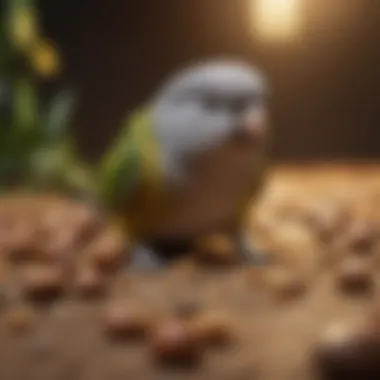
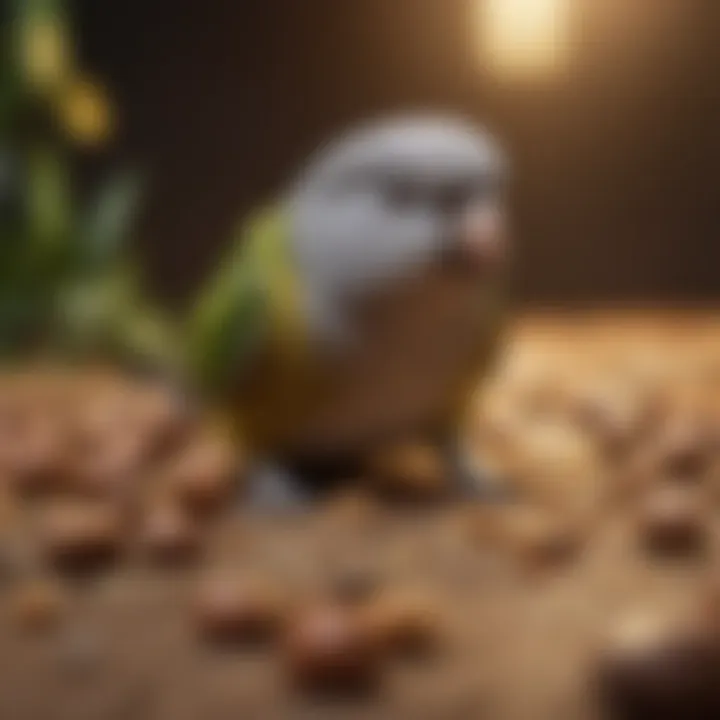
Commercial Parrot Pellets
Selecting Quality Brands
While seeds and fresh produce are essential, many avian experts recommend incorporating high-quality commercial pellets into the diet. Pellets are fortified with nutrients, ensuring your parrot gets a balanced meal with every bite. Not all pellets are equal; selecting a reputable brand can make a difference. Look for products that are specifically formulated for Senegal parrots, as they will take into account their unique nutritional needs.
For instance, brands like Harrison's Bird Foods and Kaytee Exact offer products devoid of artificial colors and preservatives. It's wise to check that the primary ingredients are wholesome grains and fresh produce derived from natural sources. A good pellet can reduce the risk of selective feeding, as parrots may pick out their favorite unhealthy seeds otherwise.
Reading Labels
Understanding how to read food labels plays a pivotal role in optimal parrot care. Labels should provide a clear breakdown of ingredients, nutritional analysis, and any additives. For instance, ensure that quality pellets have a high percentage of protein (around 14-20%) but low in fats (ideally below 7%).
Don’t shy away from checking the expiration dates too; stale pellets can lose their nutritional integrity. The benefit of knowing how to scrutinize labels lies in the trust in what you are feeding your Senegal parrot. This can ultimately lead to a healthier, more vibrant bird. Remember, in avian nutrition, knowledge is not just power—it's the key to successful feeding practices.
Avoiding Toxic Foods
Feeding your Senegal parrot provides an incredible opportunity to nurture their health and happiness. However, this responsibility comes with important considerations, especially when it comes to avoiding toxic foods. Toxic substances can lead to anything from mild digestive upset to severe health complications, and it's crucial for every bird owner to be aware of which common foods can be harmful.
Being proactive in preventing exposure to these toxic foods is a fundamental part of parrot care. The right knowledge helps ensure a safe diet which, in turn, contributes to the bird’s longevity and overall vitality. As an engaging bird parent, your goal is not just to keep your Senegal parrot alive, but to thrive and flourish.
Common Toxic Foods
When it comes to parrots, not everything that looks good or seems tasty is safe. Below are some commonly found foods that can be dangerous:
- Avocado: This fruit may appear innocent, but it's high in a substance called persin, which can cause heart problems.
- Chocolate: It's loved by many, but it's toxic to birds. It can lead to cardiovascular issues and even death.
- Onion and Garlic: These vegetables can cause hemolytic anemia in birds, damaging their red blood cells.
- Caffeine: Found in coffee and tea, caffeine stimulates the nervous system, causing panic and potentially fatal reactions.
- Certain Nuts: Not all nuts are safe; for example, bitter almonds and large quantities of walnuts can be harmful.
Additionally, it's worth noting that many processed foods contain harmful additives or preservatives. Always check ingredient labels when offering any human food to your parrot.
Signs of Toxicity
Recognizing the signs of potential toxicity can be a lifesaver. If your Senegal parrot has ingested something harmful, here’s what you may observe:
- Vomiting or Diarrhea: Any changes in stool consistency or regurgitation can signal trouble.
- Lethargy: If your parrot seems unusually tired, this could indicate distress or illness.
- Change in Appetite: A sudden refusal to eat can be a major red flag.
- Difficulty Breathing: Respiratory distress is a serious concern and should prompt immediate action.
- Neurological Symptoms: Uncoordinated movement or seizures can be signs of severe toxicity.
Always keep an eye on your parrot after introducing new foods. If any of these signs appear, don't hesitate to reach out to an avian vet.
By steering clear of harmful foods and understanding the signs of toxicity, you can make informed choices that keep your feathered friend safe. Awareness and vigilance are the keys to nurturing a happy, healthy Senegal parrot.
Feeding Strategies for Picky Eaters
When it comes to Senegal parrots, feeding them can sometimes feel like trying to solve a puzzle with missing pieces. Picky eaters among these colorful and intelligent birds present unique challenges, and understanding how to approach their eating habits is essential for their overall health and well-being. By implementing effective feeding strategies, owners can ensure their feathered friends receive the necessary nutrients while minimizing waste and frustration.
Introducing New Foods
Getting a Senegal parrot to try new foods can seem like asking a cat to swim. Their inherent reluctance can make introducing new items to the menu seem daunting. However, small changes can foster a sense of curiosity and excitement about food.
Start by offering new foods alongside their favorites. For instance, if your parrot enjoys sunflower seeds, mash up some fresh broccoli and place it alongside the seeds during mealtime. Gradually reduce the amount of seeds offered as you increase the availability of the new food. Many parrots respond positively to the presence of familiar flavors, making them more likely to explore what's new on their plate.
Another helpful tactic is to introduce a variety of textures. Some parrots are more inclined to nibble on crunchy vegetables compared to softer options. Experiment with lightly cooked carrots versus raw ones, or perhaps try a mix of leafy greens to see what might spark interest.
Finally, don’t underestimate the power of presentation. Attractive colors and shapes can engage a parrot's curiosity. Using skewers or bird-safe dishes can make the new offerings visually appealing and fun to explore.
Encouraging Healthy Choices
Encouraging your Senegal parrot to make healthy choices requires patience, understanding, and a touch of creativity. One effective strategy is to establish a routine that incorporates a variety of foods at set times. Birds thrive on consistency, and building a schedule promotes healthier eating habits.
Engagement through play can also promote healthier choices. Consider using foraging toys that require effort and thinking. By hiding vegetables or pellets within these toys, you not only keep your parrot entertained but also encourage them to nibble on nutritious options. It mimics foraging behavior found in the wild, which can be psychologically stimulating for them.
An important aspect of encouraging healthy eating involves setting an example. Birds are social creatures that learn from their surroundings. When you enjoy fruits or vegetables, share pieces with your parrot. They are often curious and will want to partake in the fun.
Incorporate occasional treats but be mindful to balance them with staple foods. Restricting treats to a specific day reinforces their value while not diminishing the importance of their regular diet.
"Feeding Senegal parrots is as much about fostering healthy habits as it is about providing sustenance. The journey to becoming a better eater often requires patience and persistence."
Understanding the nuances of feeding picky eaters can lead to discovering their likings and optimizing their diet. As your Senegal parrot explores different foods, you’ll be providing not just nutrition but also enriching their lives with the flavors of nature.
Hydration and Drinking Water
Hydration plays a crucial role in the overall health and well-being of Senegal parrots. Just like humans, these birds require an adequate intake of water to maintain their bodily functions. Without proper hydration, they can face a multitude of health issues, ranging from dehydration to more severe metabolic problems. Ensuring a regular supply of fresh water is not just a good practice; it’s essential for keeping your feathered friend happy and healthy.
Importance of Fresh Water
Fresh, clean water is the backbone of any parrot's diet. It aids in digestion, nutrient absorption, and overall metabolism. Senegal parrots tend to be curious, which means they may also get water from foods like fruits and vegetables, but this doesn't substitute the need for straight-up water. Consider these points:
- Hydration and Digestion: Water helps break down food, facilitating proper digestion. If water is lacking, your parrot may struggle with constipation or other digestive issues.
- Preventing Dehydration: On hot days or during high activity, parrots can lose water quickly. Symptoms like lethargy, dry skin, or decreased activity can indicate dehydration.
- Healthy Plumage and Skin: Adequate hydration is vital for maintaining healthy feathers and skin. Under-hydration can lead to dull feathers and skin problems.
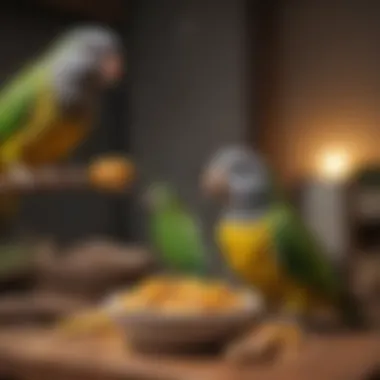
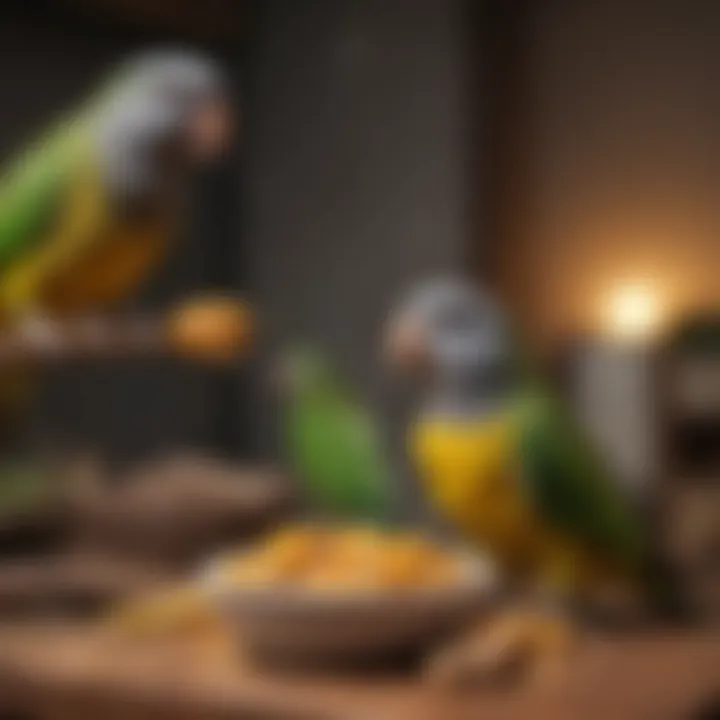
In short, having fresh water available is not a question of convenience; it's a necessity. It's also worth checking daily that the water is clean and free from any debris.
Watering Equipment
The equipment you choose for your Senegal parrot plays a significant role in ensuring they have constant access to freshwater. The right setup can make a difference in their hydration levels.
- Water Bowls: A shallow ceramic or stainless steel bowl can be a good choice. They are easier to clean and don't tip over as easily. Remember to change the water regularly—it's best to refresh it at least once a day.
- Water Bottles: Some owners prefer using water bottles with sipper tubes. These can reduce contamination since they limit exposure to droppings and keep the water cleaner for longer. However, it's essential to ensure that the bird knows how to use it.
- Multiple Sources: If you have a larger cage or multiple parrots, consider providing more than one water source. This discourages squabbles over the bowl and ensures that everyone stays hydrated.
"Regular access to clean water is essential; it prevents a host of health issues that can arise from dehydration."
By being mindful of hydration and investing in the right watering equipment, you not only promote your Senegal parrot's health but also extend their quality and longevity of life. Remember that a well-hydrated bird is a happy bird.
Monitoring Health Through Diet
Keeping a watchful eye on the dietary habits of Senegal parrots is crucial for their well-being. Proper nutrition serves as a foundation for overall health, and monitoring what your pet consumes can help identify potential issues before they escalate. A well-planned diet not only supports physical health but also can influence behavior and longevity.
Moreover, observing how your parrot reacts to its diet can provide valuable insights into its nutritional needs. It’s like being a detective on a constant quest for clues. When we include thoughtful monitoring into our feeding practices, we empower ourselves to provide a more tailored and supportive dietary experience for our feathered friends.
"What you feed your Senegal parrot today will shape how they feel and behave tomorrow!"
Recognizing Nutritional Deficiencies
Sometimes, despite our best intentions, a parrot’s diet may fall short in some areas. Nutritional deficiencies can manifest in several ways – think of it like a puzzle where a few pieces are missing. Classic signs can include:
- Feather issues: Dull, brittle feathers, or feather plucking can indicate a lack of essential fatty acids or vitamins.
- Behavioral changes: Increased aggression or lethargy might signal an imbalance in their nutritional intake.
- Digestive problems: Irregular droppings or decreased appetite can hint at improper food choices.
By staying attuned to these signs, you can adapt your Senegal parrot's diet. Regularly changing up the diet, adding fresh fruits and vegetables, or consulting with a vet might be necessary steps to mend those dietary gaps.
A comprehensive understanding of what constitutes a balanced diet will go a long way in identifying when something is amiss.
Monitoring Weight and Condition
Weight and physical condition often serve as reliable indicators of a Senegal parrot’s health. If a parrot is overweight, they could struggle with mobility and increased risk of illness. Conversely, if underweight, it might be a sign of an underlying health issue or inadequate food intake.
Keeping a simple weight log can help you track changes over time. Here are a few practical tips to monitor this:
- Regular weigh-ins: Weigh your parrot the same day each week, if possible. Use a scale that’s sensitive enough for small changes.
- Visual assessment: Look for signs of rib visibility or the prominence of breastbone. Both can indicate whether your parrot is within a healthy weight range.
- Behavior observation: A happy, healthy bird is often more active and sociable. Note any shifts in their behavior, as these can flag health concerns linked to their weight.
In essence, understanding and monitoring your Senegal parrot's weight and overall condition can empower you to make timely adjustments to their diet and care. Healthy birds are not only more vibrant but often exhibit better moods and reduced stress levels.
By dedicating a portion of your day to observation and record-keeping, you significantly enhance your understanding of your parrot's dietary status and overall health.
Consulting with Avian Veterinarians
When it comes to the health of Senegal parrots, consulting with avian veterinarians is a key piece of the puzzle. Avian vets bring a wealth of knowledge, specifically tailored for birds, which can be invaluable for pet owners. Senegal parrots, like any other pet, rely on their caregivers to not only meet their basic feeding needs but to also ensure they are thriving health-wise. Regular check-ups can mean the difference between a vibrant, happy bird and one that faces complications due to overlooked health issues.
When to Seek Professional Advice
Knowing when to consult an avian veterinarian is crucial. If your Senegal parrot shows unusual behavior such as a sudden change in appetite, excessive feather plucking, or lethargy, it’s time to raise the alarm. Other signs that shouldn't be ignored include:
- Changes in Droppings: Diarrhea or significantly altered droppings can signal health issues.
- Respiratory Distress: If the bird is having trouble breathing or has a swollen crop, professional help is essential.
- Behavioral Changes: Sudden aggression or withdrawal can mean something is wrong.
These indicators often point to dietary deficiencies or other underlying health problems. By seeking advice quickly, you can tackle potential issues before they escalate.
Creating a Nutritional Plan
Another vital aspect involves working with your veterinarian to create a customized nutritional plan for your Senegal parrot. Every bird is different; factors like age, weight, activity level, and any ongoing health concerns must be considered. A well-structured plan may include:
- Balanced Diet: A mix of pellets, seeds, fruits, and vegetables designed to meet all nutritional needs.
- Supplements: In some cases, your vet may recommend specific supplements to address any deficiencies.
- Monitoring: Regular assessments can help adjust the plan as your bird’s needs change over time.
A nutritional plan isn’t just about feeding; it's about fostering an environment where your Senegal parrot can flourish. Your vet will likely stress the significance of keeping a detailed record of your bird’s eating patterns and behavior to provide insights during consultations.
Remember, establishing rapport with your avian vet can lead to better health outcomes for your feathered friend. Partnering with them on diet and health can elevate your pet’s quality of life significantly.
By integrating these consultations into your bird care routine, you’ll not only help in preventing health issues but will also support your Senegal parrot in achieving an optimal state of well-being.
Final Thoughts on Senegal Parrot Diets
As we wrap up our discussion on the diets of Senegal parrots, it’s vital to underscore that proper nutrition is not just a simple checkbox but a cornerstone of health for these vibrant birds. A well-rounded and thoughtful approach to their feeding has far-reaching effects on their overall well-being, longevity, and mood. Effective feeding practices can create a happier, healthier bird which, in turn, enriches the bond between pet and owner.
Encouraging a Balanced Approach
Promoting a balanced diet is key to the thriving of Senegal parrots. These birds are known for their curious and playful nature, and their diet can greatly influence their behavior and energy levels. A variety of foods helps ensure they receive all necessary nutrients. A good strategy is to rotate different food types, so they do not favor one over another. Here are some pointers to achieve a balanced diet:
- Mixing Foods: Incorporate seeds, pellets, fruits, and veggies. Each type provides unique nutrients. For instance, pellets often contain essential vitamins and minerals that seeds alone might not cover.
- Fresh Choices: Always opt for fresh produce when available. As the saying goes, "You are what you eat," and this adage holds true for our feathered friends, too. Fresh fruits like apples and vegetables like carrots can be game-changers in their diet.
- Observation: Pay attention to your bird’s likes and dislikes. If they consistently avoid certain foods, find alternatives that are equally nutritious. Sometimes, it just takes a bit of trial and error.
"A balanced diet for any parrot is not merely for satisfaction; it lays a foundation for vitality and vigor."
Long-term Health Considerations
When it comes to the long-term health of Senegal parrots, maintaining a balanced and varied diet is essential. The things we feed them today can chart the course of their health into the future. Here are a few long-staying factors to consider:
- Nutritional Deficiencies: Over time, a poorly balanced diet can lead to deficiencies, resulting in health complications. For example, a lack of vitamin A may lead to vision issues and skin problems. Regularly consulting with a veterinarian about your bird's diet can help nip any potential problems in the bud.
- Weight Management: It’s a common pitfall for pet owners to overindulge their parrots. Keeping their weight in check is crucial to avoiding obesity-related issues like heart disease. Monitoring your Senegal parrot’s weight on a regular basis is a solid practice.
- Quality over Quantity: It’s tempting to fill up food dishes to the brim, but quality matters significantly. Ensuring that the food is fresh and free from preservatives is a major factor contributing to the long-term health of your parrot.















